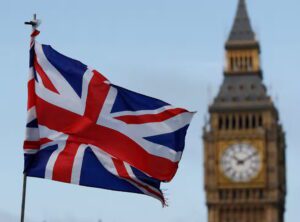
All tariffs on goods coming to Britain from Ukraine under an existing free trade deal will be axed to help the Ukrainian economy, the British government announced on Monday.
London said tariffs would be reduced to zero and all quotas removed following a direct request from Ukraine’s President Volodymyr Zelenskiy, saying the move would provide a boost for Ukrainian businesses involved in key exports such as barley, honey, tinned tomatoes and poultry.
“We stand unwaveringly with Ukraine in this ongoing fight and will work to ensure Ukraine survives and thrives as a free and sovereign nation,” said British International Trade Secretary Anne-Marie Trevelyan.
Britain said currently the average tariff on Ukrainian imports was about 22%. It said the planned change had been offered on a non-reciprocal basis, but Kyiv was likely to match the British action

Mobile operator lifecell records an increase in demand for eSIM during the war in Ukraine: since February 24, it has increased five times on average, and on some days subscribers ordered 20 times more digital SIM cards than before the outbreak of hostilities , the press service of the company said on Monday.
“From March 4 to March 7, the operator observed a peak in demand for eSIM – 25 times more subscribers joined the lifecell network using digital SIM cards than in the same period before the war. And the traffic from the Kherson region in the lifecell online store during this period exceeded the usual level of 44 times,” the report says.
This, the company notes, is due to the fact that lifecell remained the only operator that provided communication services in Kherson and the region during this period. Consistently high rates of digital SIM usage in March remained in the Kherson region and Kyiv.
In addition, the number of eSIM users during the war increased in Lviv and the Lviv region by almost six times compared to pre-war times.
Outside of Ukraine, the demand for eSIM has increased sevenfold. Most people bought a digital SIM card in Poland and Germany.

The number of buyers of domestic government bonds (OVGZ) among the population and businesses increased to 1.7 thousand last week from 1.5 thousand a week earlier.
As reported on the website of the National Bank of Ukraine (NBU) on Monday, citing data from the depository, the purchase amounted to about UAH 0.3 billion, $24 million and EUR3.2 million, compared to about UAH 0.3 billion, $1.4 million, respectively. and EUR0.1 million the week before last.
“As of April 25, more than 9.1 thousand citizens and business representatives of Ukraine became owners of military government bonds in the amount of about UAH 5.8 billion, $36 million and EUR25.2 million,” the National Bank said.
The regulator recalled that since the placement of military government bonds on March 1 at 20 primary auctions, the Ministry of Finance was able to attract about UAH 36.6 billion, $93.8 million and EUR176.5 million to the state budget.
“The largest portfolio of military government bonds is still concentrated among primary dealer banks,” the NBU specified.
According to him, the volume of investments by non-residents has remained stable over the past few weeks – more than UAH 50 million.
As reported, the total volume of issuance of military bonds is up to UAH 400 billion. They can be bought by the National Bank, which has already purchased these securities under a separate procedure for UAH 60 billion, including UAH 20 billion last week and the week before last.
The nominal rate on hryvnia government bonds is 10-11% per annum, on dollars – 3.7%, on euros – 2.5%. The term of circulation is up to 15 months.

The majority of Ukrainian orphan patients did not evacuate and remained in Ukraine, but there is no official data, the European Organization for Rare Diseases EURORDIS reported.
“There is no official data on the number of people with rare diseases who left the country. According to unofficial data and feedback from patient organizations, most people remained in Ukraine because they need additional support to leave the country, as well as the help of humanitarian organizations that can contribute to medical evacuation,” the organization told Interfax-Ukraine.
EURORDIS noted that the EU has a developed network of medical institutions specializing in rare diseases that accept patients from Ukraine. At the same time, patients remaining in Ukraine do not have the opportunity to go to such centers without additional assistance.
EURORDIS reported that in all EU countries, Ukrainians are given the same access to medical care as citizens of the country in which they are. At the same time, for many patients with orphan diseases in European countries, there are different methods of treatment than those used in Ukraine, which help to cope with symptoms, prolong life or prevent deterioration.
“In many cases, people living with rare diseases in Ukraine are treated with drugs other than those in an EU country. In such cases, the EU will work with families to identify the most appropriate substitutes. However, this means that a patient with a rare disease it is necessary to contact a specialized center,” emphasizes EURORDIS.
As reported, Airbnb provides patients with rare (orphan) diseases leaving Ukraine with free housing for a period of a month. The project is being implemented as part of a partnership with Airbnb, which is implementing a larger Airbnb.org program to provide housing for 100,000 refugees leaving Ukraine. At the same time, EURORDIS collects information on the situation of migrants with orphan diseases and their needs for short-term housing. Based on this information, Airbnb.org, after reviewing the request, will issue a voucher for booking accommodation through its platform.
The European Organization for Rare Diseases EURORDIS brings together almost 1000 patient organizations in 74 countries.
In Ukraine, there are about 2 million people living with rare diseases (such as spinal muscular atrophy).

The rate of bitcoin against the US dollar fell on Monday to a minimum of six weeks against the backdrop of a general risk aversion from investors due to signals of the “hawkish” mood of the Federal Reserve System (Fed).
The value of the cryptocurrency fell during trading to the lowest level since March 15, $38,223, which is 20% lower than the peak level recorded last month. As of 15:00 CST, the bitcoin rate is $38,812.
Ether (Ether) on Monday fell to $ 2799 – a minimum since March 18.
Experts note that technical analysis indicators point to the possibility of a further rollback of bitcoin.
“Bitcoin breaks a key two-month trend line, which could mean a further pullback to January lows,” said Fundstrat analyst Mark Newton, quoted by Market Watch. He expects bitcoin to drop to $36,300, and if it goes lower, he could test the $32,950 level.
Currently, bitcoin is closer to the lower end of the $35,000-45,000 price range in which it has been trading since the beginning of this year.
The dynamics of the cryptocurrency clearly correlates with the dynamics of the Nasdaq 100 index of technology companies, with a negative correlation with the dollar.
As investors wait for a substantial increase in the base interest rate by the Federal Reserve System (Fed) in the coming months, some of the factors that support the demand for cryptocurrencies are fading away.
“As it becomes more profitable to hold dollars, investors can shift funds from bitcoin or gold,” Nydig experts say. “We see a negative correlation of bitcoin’s performance with both the dollar and interest rates.”
Bitcoin’s momentum is still largely driven by fundamental factors such as user growth and the expansion of the crypto usage network, but it’s important to understand the emerging macroeconomic links as well, says Nydig.

U.S. President Joseph Biden intends to nominate Bridget Brink as U.S. Ambassador to Ukraine.
“Today, President Biden announced his intention to nominate veteran U.S. diplomat Bridget A. Brink to serve as Ambassador Extraordinary and Plenipotentiary to Ukraine,” the White House said on its website on Monday.
Bridget A. Brink, a career member of the Senior Foreign Service, currently serves as the U.S. Ambassador to the Slovak Republic. Prior to that, she served as Senior Advisor and Deputy Assistant Secretary in the Bureau of European and Eurasian Affairs at the U.S. Department of State, with responsibility for issues related to Eastern Europe and the Caucasus. She also served as Deputy Chief of Mission at the U.S. Embassies in Tashkent, Uzbekistan, and Tbilisi, Georgia. Brink spent her twenty-five-year career in the Foreign Service focused on advancing U.S. policy in Europe and Eurasia. She was the Director for the Aegean and the South Caucasus at the National Security Council and served in the State Department as the Deputy Director for Southern European Affairs, Special Assistant to the Under Secretary for Political Affairs, and Cyprus Desk Officer. She began her career in Belgrade, Serbia.
Originally from Michigan, Brink is the recipient of numerous performance awards. She holds Master’s degrees in International Relations and Political Theory from the London School of Economics and Political Science, as well as a Bachelor’s degree in Political Science from Kenyon College. She speaks Russian and has studied Slovak, Serbian, Georgian, and French.